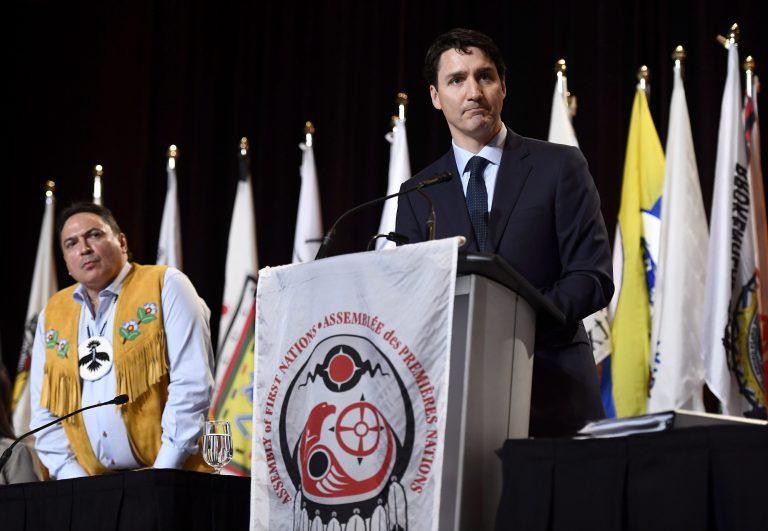Trudeau lowers expectations for swift, sweeping action on Indigenous issues
‘We can do this quickly or we can do this right,’ he says, challenging First Nations leaders to set priorities and then sign on to new policies

Prime Minister Justin Trudeau and AFN National Chief Perry Bellegarde listen to a question after the Prime Minister’s address at the Assembly of First Nations Special Chiefs Assembly, in Gatineau, Que., on Wednesday, May 2, 2018. THE CANADIAN PRESS/Justin Tang
Share
After delivering a prepared statement that really didn’t amount to much at a special meeting of the Assembly of First Nations this morning, Prime Minister Justin Trudeau’s tone turned far more forceful when questions from the floor posed by Indigenous leaders pressed him to commit to delivering fast, definitive change.
“We can do this quickly or we can do this right, and I know those two are mutually exclusive,” Trudeau said near the end of a single answer that went on for more than 10 minutes, during which he repeatedly warned AFN chiefs and delegates against expecting sweeping, swift solutions on how Indigenous rights are recognized and First Nations get federal funding.
For instance, the AFN, the umbrella group for more than 600 chiefs representing about 900,000 First Nations people, is pressing for more predictable, long-term funding for its member communities. Beyond pledging to work on that priority, Trudeau said he is “very wary to tell you what that’s going to look like in general for all of you, because it needs to be looked at specifically with each of you.”
Instead of holding out hope of new, overarching rules for the relationship between Ottawa and all First Nations, the Prime Minister described an ongoing process under which the federal government would carefully negotiate new arrangements with individual First Nations that might “set a bar” and serve as a model for others.
Trudeau cautiously predicted progress on “certain aspects” of the fiscal relationship between Ottawa and some First Nations before the fall 2019 federal election. But then he said pointedly: “Will we be able to define what the fiscal relationship looks like for the nation-to-nation relationship, between the government of Canada and Indigenous peoples, in the next 18 months? Obviously not.”
Policy priorities and capacity to deliver programs, he said, vary widely among First Nations. “So there is no one-size-fits-all approach. What is true in every single case is that you have a partner in the federal government who is saying, ‘What is it that you need? What are your priorities?’”
Later at the AFN meeting, held at a casino hotel in Gatineau, Que., just across the Ottawa River from Parliament Hill, Indigenous Services Minister Jane Philpott carried on in a similar vein. She raised the possibility of a federal law that would assert First Nations jurisdiction over child welfare services—an extremely sensitive question among many AFN leaders, given the large numbers of Indigenous children in foster care—but stressed that the Liberal government would not act alone.
“I want to make it very clear that we are not in a world where this federal government is going to impose legislation. If we’re going to move forward on legislation, it has to be co-created and it needs your support,” Philpott told the AFN chiefs and delegates. “If you want that done by the next federal election, I need to hear from you so we can move forward on next steps.”
RELATED: Are First Nations back to vague assurances on child welfare?
Putting the onus on First Nations leaders to shape and then support federal policy was a repeated theme in Trudeau’s answers, too. Asked if his government would move forward before the next election with a promised law to protect and promote Indigenous languages, he answered, “Ottawa won’t tell you guys how to protect your languages. We’re going to take the time you feel is necessary to get this right.”
It’s not the first time Trudeau has shifted from talking about what the federal government must do to repair relations with Indigenous people to what they need to do for that change to happen. In his landmark speech to the United Nations last fall on Canada’s shameful record on First Nation, Inuit and Métis peoples, he said Indigenous leaders must take “a hard look at how they define and govern themselves as nations and governments, and how they seek to relate to other orders of government.”
How fast AFN members are ready to work toward change is being tested by a consultation process Trudeau announced back in mid-February, aimed at creating a new legislated “framework,” which the Liberals hope would clarify how First Nations could achieve self-government and stop being managed under the terms of the reviled Indian Act.
Chiefs and delegates at the this week’s AFN meeting were divided on how to respond to the government’s framework proposal, along with other urgent issues, like child welfare and the promised Indigenous languages law. That immediate policy agenda is packed. Yet Trudeau said he is playing a long game—a perspective he said comes partly from growing up as the son of former prime minister Pierre Trudeau.
“Perhaps one of the things that I have as an advantage over some of my political peers is that I got to see, as a kid, my father working very, very hard on things,” he said in that long answer about how much can be accomplished fast. “I get to reflect now on the things that he did that actually made a different 30 or 40 years later, and the other things that are just footnotes in the history books that seemed by matter quit a bit at the time, but didn’t last, didn’t set Canada on a path forward.”